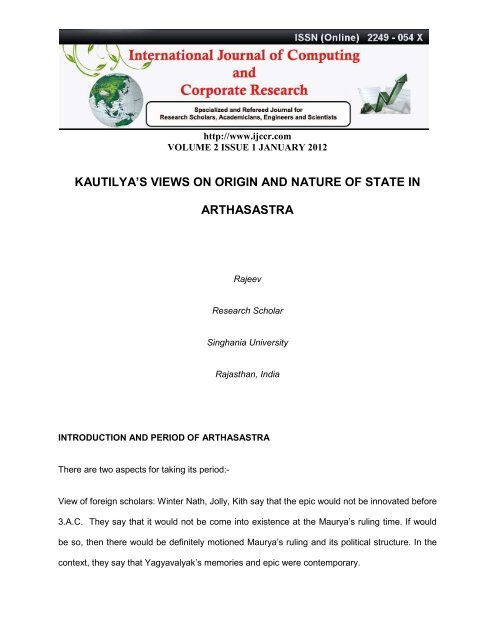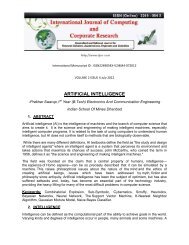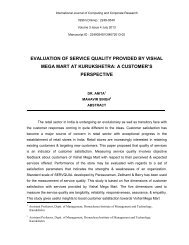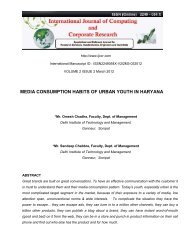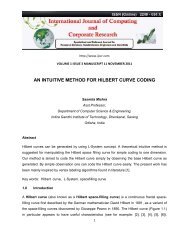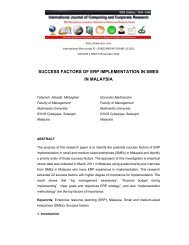kautilya's views on origin and nature of state in arthasastra - Ijccr.com
kautilya's views on origin and nature of state in arthasastra - Ijccr.com
kautilya's views on origin and nature of state in arthasastra - Ijccr.com
You also want an ePaper? Increase the reach of your titles
YUMPU automatically turns print PDFs into web optimized ePapers that Google loves.
http://www.ijccr.<strong>com</strong><br />
VOLUME 2 ISSUE 1 JANUARY 2012<br />
KAUTILYA’S VIEWS ON ORIGIN AND NATURE OF STATE IN<br />
ARTHASASTRA<br />
Rajeev<br />
Research Scholar<br />
S<strong>in</strong>ghania University<br />
Rajasthan, India<br />
INTRODUCTION AND PERIOD OF ARTHASASTRA<br />
There are two aspects for tak<strong>in</strong>g its period:-<br />
View <strong>of</strong> foreign scholars: W<strong>in</strong>ter Nath, Jolly, Kith say that the epic would not be <strong>in</strong>novated before<br />
3.A.C. They say that it would not be <strong>com</strong>e <strong>in</strong>to existence at the Maurya’s rul<strong>in</strong>g time. If would<br />
be so, then there would be def<strong>in</strong>itely moti<strong>on</strong>ed Maurya’s rul<strong>in</strong>g <strong>and</strong> its political structure. In the<br />
c<strong>on</strong>text, they say that Yagyavalyak’s memories <strong>and</strong> epic were c<strong>on</strong>temporary.
http://www.ijccr.<strong>com</strong><br />
VOLUME 2 ISSUE 1 JANUARY 2012<br />
View <strong>of</strong> Indian scholars: Dr. Jaisawal. Dr. Shyamshastri agrees with that Arthasastra is<br />
the <strong>in</strong>novati<strong>on</strong> <strong>of</strong> Ch<strong>and</strong>erGupta’s Prime M<strong>in</strong>ister Kautilya. They say that Ch<strong>and</strong>er Gupta caught<br />
the thr<strong>on</strong>e <strong>in</strong> 321 B.C. <strong>and</strong> Ashoka 296 B.C. respectively. Therefore, this epic would be between<br />
321B.C.to 300B.C. Kautilya <strong>in</strong>novated it for guidance Maurya’s rul<strong>in</strong>g. Indian literature says that<br />
<strong>in</strong> epics <strong>of</strong> Ja<strong>in</strong>ism <strong>and</strong> Buddhism we can get the <strong>in</strong>formati<strong>on</strong> about Kautilya.<br />
At the analysis <strong>of</strong> above aspects Dr. Shyam lal P<strong>and</strong>ey says, “The epic Arthasastra<br />
either c<strong>on</strong>temporary <strong>of</strong> Maurya or a new editi<strong>on</strong> after ruled but it has to be accepted that political<br />
pr<strong>in</strong>ciples <strong>in</strong> this epic are <strong>of</strong> Maurya’s time. 1<br />
Nature <strong>and</strong> subject-matter <strong>of</strong> Arthasastra<br />
Arthasastra may be an epic with its name, but it is not. It <strong>in</strong>forms <strong>on</strong>ly about structure <strong>of</strong><br />
rul<strong>in</strong>g <strong>of</strong> a <strong>state</strong>. T.N.Ramaswamy said, “The Arthasastra is truly an anthology <strong>of</strong> political<br />
wisdom <strong>and</strong> theory <strong>and</strong> an art <strong>of</strong> <strong>state</strong>craft, scattered <strong>in</strong> pre-Kautilyan writ<strong>in</strong>gs, streaml<strong>in</strong>ed <strong>and</strong><br />
re<strong>in</strong>terpreted by Kautilya <strong>in</strong> his attempt to c<strong>on</strong>struct a separate <strong>and</strong> dist<strong>in</strong>ct science <strong>of</strong><br />
<strong>state</strong>craft.”<br />
Dr. Shastri is creditable for tak<strong>in</strong>g it <strong>in</strong>to exist<strong>in</strong>g life. He was the healer <strong>of</strong> library <strong>of</strong><br />
oriental. He got a script <strong>of</strong> P<strong>and</strong>ulipi from a sa<strong>in</strong>t (Brahman) from T<strong>in</strong>jore <strong>and</strong> versi<strong>on</strong>ed it <strong>in</strong>to<br />
English <strong>in</strong> 1905. The first editi<strong>on</strong> <strong>of</strong> epic was published <strong>in</strong> 1909 with the help <strong>of</strong> Mysore.
http://www.ijccr.<strong>com</strong><br />
VOLUME 2 ISSUE 1 JANUARY 2012<br />
In the <strong>in</strong>itial part, Brahaspati from Gods <strong>and</strong> Sukra from Ga<strong>in</strong>ts had been worshipped.<br />
Accord<strong>in</strong>g to Kautilya “Artha” means liv<strong>in</strong>g <strong>and</strong> Earth, Liv<strong>in</strong>g is related to everybody <strong>and</strong> earth<br />
wanted to get fro k<strong>in</strong>gdom exp<strong>and</strong>asi<strong>on</strong>. Thus, Arthasastra is an epic which works for guidance<br />
<strong>of</strong> k<strong>in</strong>g, rul<strong>in</strong>g <strong>and</strong> politics. 2<br />
Orig<strong>in</strong> <strong>of</strong> the <strong>state</strong><br />
Kautilya’s philosophy says <strong>state</strong> as central theme. M<strong>on</strong>archy system was adopted <strong>in</strong> that<br />
time. Kautilya had discussed about <strong>state</strong>’s <strong>orig<strong>in</strong></strong>, <strong>nature</strong> <strong>and</strong> work<strong>in</strong>g. In regard<strong>in</strong>g to <strong>orig<strong>in</strong></strong> <strong>of</strong><br />
<strong>state</strong> he accepted the theory <strong>of</strong> social-cohesi<strong>on</strong>. There was <strong>in</strong>justice everywhere <strong>in</strong> the society.<br />
So, Manu had been selected as ruler. Indian religious epic had been c<strong>on</strong>sidered as to be first<br />
Indian k<strong>in</strong>g. People decided to give the 1/6 <strong>of</strong> their harvest, 1/10 <strong>of</strong> their trades <strong>and</strong> some taxes<br />
from gold. Kautilya had not thought about the m<strong>on</strong>archy. He could <strong>on</strong>ly use <strong>of</strong> this wealth for<br />
welfare <strong>and</strong> security <strong>of</strong> the people. Thus, by Kautilya’s view was used for social cohesi<strong>on</strong>. In this<br />
c<strong>on</strong>text Dr. Shamasastry says, “The theory <strong>of</strong> social c<strong>on</strong>tract was not unknown <strong>in</strong> the days <strong>of</strong><br />
Chanakya.” 3<br />
Kautilya did not speculate <strong>on</strong> the <strong>orig<strong>in</strong></strong> <strong>of</strong> the <strong>state</strong>. Like Machiavelli, he was c<strong>on</strong>cerned<br />
with the State <strong>of</strong> his own times. He was not <strong>in</strong>terested <strong>in</strong> the questi<strong>on</strong> as the how the State,<br />
which had <strong>com</strong>e <strong>in</strong>to the possessi<strong>on</strong> <strong>of</strong> Ch<strong>and</strong>ragupta Maurya, had been brought up <strong>in</strong>to the<br />
existence, but with the more urgent problem <strong>of</strong> how to make it a mighty <strong>and</strong> vigorous <strong>state</strong>
http://www.ijccr.<strong>com</strong><br />
VOLUME 2 ISSUE 1 JANUARY 2012<br />
ready to face <strong>in</strong>ternal as well as external dangers. At best, the Mauryan Prime M<strong>in</strong>ister could<br />
trace the <strong>orig<strong>in</strong></strong> <strong>of</strong> Mauryan State to the misdeeds <strong>of</strong> the N<strong>and</strong>a. Though he described <strong>in</strong><br />
detailed the formati<strong>on</strong> <strong>of</strong> villages <strong>and</strong> the different aspects <strong>of</strong> the village <strong>and</strong> town life yet there is<br />
no reference to the <strong>orig<strong>in</strong></strong> or evoluti<strong>on</strong> <strong>of</strong> the State <strong>in</strong> Kautilya. 4<br />
For underst<strong>and</strong><strong>in</strong>g the Indian political th<strong>in</strong>k<strong>in</strong>g there are two major sources<br />
(a)<br />
Human be<strong>in</strong>g <strong>and</strong> the other is<br />
(b)<br />
His thoughts<br />
One <strong>of</strong> them <strong>of</strong> Mahatma Buddha <strong>and</strong> the later is Kautilya. But both have the opposite<br />
th<strong>in</strong>k<strong>in</strong>g as Buddha is c<strong>on</strong>sidered Idealism <strong>and</strong> Kautilya Pragmatic. Because <strong>of</strong> this merit he<br />
(Kautilya) has a specific place <strong>in</strong> India th<strong>in</strong>kers. So, Sale tore says that “<strong>of</strong> all the school <strong>of</strong><br />
ancient Indian political thought, the most noteworthy is that <strong>of</strong> Kautilya.” 5<br />
Nature <strong>of</strong> the <strong>state</strong><br />
<strong>state</strong>,<br />
Kautilya had discussed about organism <strong>of</strong> <strong>state</strong>. He c<strong>on</strong>sidered seven organs <strong>of</strong> the<br />
1. Master or k<strong>in</strong>g<br />
2. Amatya or m<strong>in</strong>isters
http://www.ijccr.<strong>com</strong><br />
VOLUME 2 ISSUE 1 JANUARY 2012<br />
3. Janpad or country<br />
4. Durg or fort<br />
5. Kosh or treasury<br />
6. Punishments<br />
7. Friend<br />
This organism was known as Kautilya’s pr<strong>in</strong>ciple for <strong>nature</strong> <strong>of</strong> the <strong>state</strong>. He made it by<br />
<strong>in</strong>spir<strong>in</strong>g the Holy books like the Mahabharta. Here Dr. Shamasastry has said about Kautilya’s<br />
view for <strong>nature</strong> <strong>of</strong> <strong>state</strong> that each sovereign <strong>state</strong> must c<strong>on</strong>ta<strong>in</strong> seven members (angs), such as<br />
the k<strong>in</strong>g, the m<strong>in</strong>ister, the country, the fort, the treasury, the army <strong>and</strong> the friend. 6<br />
Types <strong>of</strong> State<br />
At the time <strong>of</strong> Kautilya there were some types <strong>of</strong> <strong>state</strong>, which are this follow<strong>in</strong>g way;<br />
State : Such <strong>state</strong> <strong>in</strong> which the rule was based <strong>on</strong> c<strong>on</strong>flict. Kautilya says that this c<strong>on</strong>flict is<br />
natural because <strong>of</strong> heredity. In this two pers<strong>on</strong>s might be two brothers or the father <strong>and</strong> the s<strong>on</strong>.<br />
He suggested that the problem could be solved by the m<strong>in</strong>ister’s suggesti<strong>on</strong>s.<br />
Vairajya : Such type <strong>of</strong> <strong>state</strong> was not appropriate for people, because <strong>of</strong> <strong>in</strong> such c<strong>on</strong>diti<strong>on</strong>s a<br />
k<strong>in</strong>g could exploit the people by rul<strong>in</strong>g <strong>on</strong> them. 7
http://www.ijccr.<strong>com</strong><br />
VOLUME 2 ISSUE 1 JANUARY 2012<br />
Dualism (sangh rajya) : There was m<strong>in</strong>iature <strong>of</strong> republic <strong>state</strong>s. These <strong>state</strong>s had adopted<br />
dualism. These were <strong>in</strong>dependent <strong>and</strong> self-reliance but could not face the larger enemies. In<br />
such dualistic <strong>state</strong>s k<strong>in</strong>g was not permanent <strong>and</strong> used to get together at critical occasi<strong>on</strong>s.<br />
In his time Mugdh was also a dualistic <strong>state</strong>. Therefore, he presented his <str<strong>on</strong>g>views</str<strong>on</strong>g> for<br />
mak<strong>in</strong>g str<strong>on</strong>g these <strong>state</strong>s. Integrati<strong>on</strong> method was good for these <strong>state</strong>s. He says that the k<strong>in</strong>g<br />
should appo<strong>in</strong>t detective for gett<strong>in</strong>g <strong>in</strong>formati<strong>on</strong>, he (the k<strong>in</strong>g) should do everyth<strong>in</strong>g with his best<br />
approach <strong>and</strong> ability.<br />
Kautilya supports to <strong>com</strong>prehensive functi<strong>on</strong> <strong>of</strong> <strong>state</strong>. He says that the functi<strong>on</strong> <strong>of</strong> it not<br />
<strong>on</strong>ly to secure but also to develop all-round development <strong>of</strong> its people. A <strong>state</strong> can fulfill all his<br />
need when it has ec<strong>on</strong>omic back-b<strong>on</strong>e strength. Only <strong>on</strong> the basis <strong>of</strong> ec<strong>on</strong>omic citizens can get<br />
their aims <strong>of</strong> life. A <strong>state</strong> should be adopted such policies by which export may be more than<br />
import, <strong>and</strong> makes a happy human be<strong>in</strong>g with his glorious future. A man may be got religi<strong>on</strong>,<br />
work. He (man) may be led a happy life.<br />
Tak<strong>in</strong>g <strong>nature</strong> <strong>and</strong> functi<strong>on</strong>s there were two k<strong>in</strong>ds <strong>of</strong> pr<strong>in</strong>ciples. One was n<strong>on</strong>materialistic<br />
<strong>and</strong> later <strong>on</strong>e was materialistic. Former pr<strong>in</strong>ciple is emphasized <strong>on</strong> salvati<strong>on</strong> <strong>of</strong><br />
be<strong>in</strong>g life <strong>and</strong> the later <strong>on</strong>e is <strong>on</strong> luxury life. Kautilya selects the mixture way <strong>of</strong> dual above <strong>and</strong><br />
gives importance to mean, religious <strong>and</strong> work.
http://www.ijccr.<strong>com</strong><br />
VOLUME 2 ISSUE 1 JANUARY 2012<br />
N.C. B<strong>and</strong>yaopadhyaya, “The <strong>state</strong> accord<strong>in</strong>g to Kautilya must be based <strong>on</strong> sound<br />
ec<strong>on</strong>omic foundati<strong>on</strong>s, so as to enables men to realize the aims <strong>of</strong> life.” 8<br />
Objectives <strong>and</strong> Functi<strong>on</strong>s <strong>of</strong> Kautilya’s State<br />
In Kautilya’s ec<strong>on</strong>omics <strong>state</strong> is the central po<strong>in</strong>t. The objective <strong>of</strong> a <strong>state</strong> not <strong>on</strong>ly to<br />
secure but also welfare works for people. For <strong>com</strong>plet<strong>in</strong>g objectives he <strong>in</strong>tegrated many<br />
<strong>in</strong>stituti<strong>on</strong>s. The objectives are to secure people, to preserve them from natural calamities, to kill<br />
enemies’ detective who may be harmful for the <strong>state</strong>. Kautilya th<strong>in</strong>ks that for a k<strong>in</strong>g <strong>state</strong> is<br />
everyth<strong>in</strong>g with it a k<strong>in</strong>g is noth<strong>in</strong>g. 9<br />
B<strong>and</strong>yopadhyaya, “The <strong>state</strong>, thus accord<strong>in</strong>g to Kautilya, must be base <strong>on</strong> sound<br />
ec<strong>on</strong>omic foundati<strong>on</strong>s, so as to enables men to realize the aims <strong>of</strong> his life, to less<strong>on</strong> as much as<br />
possible, the struggle <strong>of</strong> existence at home, to lessen the dependence <strong>of</strong> the <strong>com</strong>munity <strong>on</strong> the<br />
outside world, to be <strong>in</strong> a positi<strong>on</strong> to help others secti<strong>on</strong>s <strong>of</strong> humanity is distress, <strong>and</strong> thereby to<br />
ensure <strong>on</strong> existence c<strong>on</strong>ducive to the happ<strong>in</strong>ess <strong>of</strong> men <strong>in</strong> this life <strong>and</strong> pav<strong>in</strong>g the way to a<br />
brighter bey<strong>on</strong>d.”<br />
Accord<strong>in</strong>g to Kautilya <strong>state</strong> is not <strong>on</strong>ly a materialistic but a spiritual also. The objective <strong>of</strong><br />
a <strong>state</strong> is not <strong>on</strong>ly to manage religious, means <strong>and</strong> work for people but to create such situati<strong>on</strong><br />
also such like, without colour, creed, <strong>and</strong> caste. For <strong>com</strong>prehensive objective he emphasizes <strong>on</strong><br />
<strong>state</strong>’s scope. 10
http://www.ijccr.<strong>com</strong><br />
VOLUME 2 ISSUE 1 JANUARY 2012<br />
Kautilya says that for gett<strong>in</strong>g work, means, religious a <strong>state</strong> should do work <strong>in</strong> follow<strong>in</strong>g<br />
way:-<br />
• Agriculture: - It is the back-b<strong>on</strong>e <strong>of</strong> a <strong>state</strong>’s ec<strong>on</strong>omic. A <strong>state</strong> to have cultivated l<strong>and</strong><br />
which can fulfill the need <strong>of</strong> the food. Plantati<strong>on</strong> should be started. Transport may also<br />
be managed for it.<br />
• Adm<strong>in</strong>istrative Appo<strong>in</strong>tments: -For a good adm<strong>in</strong>istrati<strong>on</strong> there should be essential<br />
appo<strong>in</strong>tments. It is the k<strong>in</strong>g’s resp<strong>on</strong>sibility.<br />
• Military Functi<strong>on</strong>: - The <strong>state</strong>’s safety is also a major c<strong>on</strong>cern. For it an <strong>in</strong>tegrated <strong>and</strong><br />
powerful military is essential which may be able to face outsider’s attack.<br />
• Judicial Functi<strong>on</strong>: - Such a judicial functi<strong>on</strong> which may be punished pris<strong>on</strong>ers.<br />
• Ec<strong>on</strong>omic Functi<strong>on</strong>: - State’s strength is base <strong>on</strong> treasury <strong>and</strong> trad<strong>in</strong>g. It should be<br />
fulfill<strong>in</strong>g its mean<strong>in</strong>g.<br />
• Diplomatic Functi<strong>on</strong>:-Kautilya was not known for <strong>in</strong>ternal management. Ambassador<br />
should be appo<strong>in</strong>ted <strong>on</strong> the basis <strong>of</strong> neighbor’s behaviour.<br />
• Industrial Functi<strong>on</strong>: - capital <strong>and</strong> labour should be selected <strong>in</strong> <strong>in</strong>dustries for a <strong>state</strong>.<br />
• Luxury: - Luxury was also <strong>in</strong>volved by Kautilya <strong>in</strong> his work<strong>in</strong>g functi<strong>on</strong> <strong>of</strong> the <strong>state</strong>. He<br />
says that for the security <strong>of</strong> <strong>state</strong> employees should be appo<strong>in</strong>ted, by which the other<br />
streams would be un<strong>in</strong>volved such luxury life.
http://www.ijccr.<strong>com</strong><br />
VOLUME 2 ISSUE 1 JANUARY 2012<br />
• Bus<strong>in</strong>ess Functi<strong>on</strong>: - Trades should be under c<strong>on</strong>trol. For it th<strong>in</strong>gs should be sold <strong>in</strong> the<br />
market <strong>and</strong> measurement should also be corrected.<br />
• Spiritual Functi<strong>on</strong>: - Kautilya expects that the k<strong>in</strong>g to appo<strong>in</strong>t Brahman <strong>and</strong> manage the<br />
<strong>state</strong> accord<strong>in</strong>g to Dharmasastra <strong>and</strong> protect the Dharma/religious. He says that the duty<br />
<strong>of</strong> a <strong>state</strong> to develop spiritual field <strong>of</strong> a human be<strong>in</strong>g not a materialistic world.<br />
• Social Welfare: - Kautilya says that the objective <strong>of</strong> <strong>state</strong> not <strong>on</strong>ly prosperity but also<br />
social welfare, because a prosperous pers<strong>on</strong> can build a prosperous nati<strong>on</strong>. Kautilya<br />
says, “A k<strong>in</strong>g checks the fam<strong>in</strong>e at all. Who serves the gra<strong>in</strong> even <strong>in</strong> fam<strong>in</strong>e days, he is<br />
real a k<strong>in</strong>g.” A <strong>state</strong> should provide work to widows, the h<strong>and</strong>icapped <strong>and</strong> others.<br />
Kautilya emphasized all the streams <strong>of</strong> <strong>state</strong> by which religious, means, <strong>and</strong><br />
work/activities affect. For religi<strong>on</strong>, a <strong>state</strong>’s those works emphasizes, which may be helpful for<br />
people <strong>and</strong> secur<strong>in</strong>g for people. For gett<strong>in</strong>g ec<strong>on</strong>omy he emphasizes <strong>on</strong> <strong>in</strong>dustrious, agriculture<br />
<strong>and</strong> trade-fair, <strong>and</strong> for work<strong>in</strong>g <strong>on</strong> luxury. Thus, <strong>in</strong> such a way, <strong>on</strong> the basis <strong>of</strong> various objectives<br />
<strong>and</strong> works, State called the <strong>state</strong> a secularism <strong>and</strong> welfare <strong>state</strong>. Robs<strong>on</strong>, “The idea <strong>of</strong> welfare<br />
<strong>state</strong> must be as old as the history <strong>of</strong> mank<strong>in</strong>d <strong>and</strong> it is certa<strong>in</strong>ly much older than the <strong>state</strong>.” 11<br />
The Functi<strong>on</strong>s <strong>of</strong> the M<strong>on</strong>arch State<br />
Accord<strong>in</strong>g to Kautilya the k<strong>in</strong>g is the first <strong>and</strong> foremost organ <strong>of</strong> the <strong>state</strong>. Without him<br />
the <strong>state</strong> is noth<strong>in</strong>g. This type <strong>of</strong> <strong>state</strong> is harmful for its people. He says without a k<strong>in</strong>g there was
http://www.ijccr.<strong>com</strong><br />
VOLUME 2 ISSUE 1 JANUARY 2012<br />
noth<strong>in</strong>g, there was corrupti<strong>on</strong> everywhere. Thus, the k<strong>in</strong>g emerges for protect<strong>in</strong>g people. Thus,<br />
a k<strong>in</strong>g should be such who can get religi<strong>on</strong>, ec<strong>on</strong>omy <strong>and</strong> work. He may have specific abilities.<br />
Kautilya says, “The miseries <strong>of</strong> Dem<strong>on</strong>s (people) lies <strong>in</strong> the k<strong>in</strong>g. A k<strong>in</strong>g should not be selfish.<br />
He should th<strong>in</strong>k about his people.”<br />
Kautilya says extraord<strong>in</strong>ary pers<strong>on</strong> to him, Kautilya emphasizes <strong>on</strong> specific merits <strong>of</strong><br />
k<strong>in</strong>g <strong>and</strong> says, “Because the k<strong>in</strong>g is best <strong>in</strong> himself. He may have the virtue <strong>of</strong> Rishi/sa<strong>in</strong>t as well<br />
as human be<strong>in</strong>g.”<br />
He c<strong>on</strong>siders the <strong>nature</strong> <strong>of</strong> Saptang <strong>of</strong> the <strong>state</strong> <strong>and</strong> the k<strong>in</strong>g is central po<strong>in</strong>t <strong>on</strong> whom all<br />
organs revolve. He says, “These organs are essential. Effect <strong>and</strong> importance are depended <strong>on</strong><br />
the task that how he is us<strong>in</strong>g these organs. 12<br />
Qualificati<strong>on</strong>s <strong>and</strong> Qualities <strong>of</strong> the k<strong>in</strong>g:-<br />
1. A k<strong>in</strong>g should be perfect by physically, mentally, <strong>and</strong> <strong>in</strong>tellectual.<br />
2. He should be punctual.<br />
3. He should have the c<strong>on</strong>trol own senses.<br />
4. He should <strong>com</strong>plete the objectives <strong>of</strong> religious, ec<strong>on</strong>omy <strong>and</strong> work.<br />
Privileges <strong>of</strong> the k<strong>in</strong>g:-<br />
1. He is supreme power.
http://www.ijccr.<strong>com</strong><br />
VOLUME 2 ISSUE 1 JANUARY 2012<br />
2. No tax can be imposed <strong>on</strong> him.<br />
3. He is the owner <strong>of</strong> the n<strong>on</strong>-relat<strong>in</strong>g m<strong>on</strong>ey.<br />
4. He is the owner <strong>of</strong> hidden m<strong>on</strong>ey.<br />
5. He can’t be called for witness <strong>in</strong> court.<br />
He had been provided these privileges such that he can follow his duty very well. He<br />
can’t use these rights for luxury. So, for check<strong>in</strong>g luxury life, he had been imposed some social<br />
<strong>and</strong> religious traditi<strong>on</strong>s, which can’t be opposed by the k<strong>in</strong>g.<br />
Rout<strong>in</strong>e <strong>of</strong> the k<strong>in</strong>g:-<br />
Kautilya divid<strong>in</strong>g his rout<strong>in</strong>e <strong>in</strong>to eight parts<br />
Rout<strong>in</strong>e <strong>of</strong> the day:-<br />
• To <strong>in</strong>vestigate secured organizati<strong>on</strong> for protect<strong>in</strong>g the people.<br />
• To do pers<strong>on</strong>al work.<br />
• To solve the riots <strong>of</strong> people.<br />
• To get <strong>in</strong>formati<strong>on</strong> about treasury <strong>and</strong> give <strong>in</strong>structi<strong>on</strong>s.<br />
• To discuss with m<strong>in</strong>isters <strong>and</strong> detective.<br />
• To recreate <strong>and</strong> study.<br />
• To <strong>in</strong>vestigate <strong>of</strong> army with their weap<strong>on</strong>s.
http://www.ijccr.<strong>com</strong><br />
VOLUME 2 ISSUE 1 JANUARY 2012<br />
• To discuss with <strong>com</strong>m<strong>and</strong>er-<strong>in</strong>-chief.<br />
Rout<strong>in</strong>e <strong>of</strong> the night:-<br />
• To get <strong>in</strong>formati<strong>on</strong> <strong>and</strong> give <strong>in</strong>structi<strong>on</strong> to detectives.<br />
• To do pers<strong>on</strong>al work.<br />
• Recreat<strong>in</strong>g work.<br />
• To feel relax <strong>and</strong> sleep<br />
• To prepare time-schedule for the next day.<br />
• To discuss with <strong>in</strong>tellectual people.<br />
• To do religious work.<br />
Thus, Kautilya discusses his rout<strong>in</strong>e <strong>on</strong> the pr<strong>in</strong>ciple <strong>of</strong> religious, ec<strong>on</strong>omy <strong>and</strong> work.<br />
Security <strong>of</strong> the K<strong>in</strong>g<br />
Kautilya has emphasized <strong>of</strong> security <strong>of</strong> the k<strong>in</strong>g <strong>and</strong> expla<strong>in</strong>ed <strong>in</strong> ec<strong>on</strong>omy. A k<strong>in</strong>g<br />
should suggest some follow<strong>in</strong>g ways by which he can get security:-<br />
• The k<strong>in</strong>g ac<strong>com</strong>plishes arms/weap<strong>on</strong>s pers<strong>on</strong>s with him.<br />
• Army should be appo<strong>in</strong>ted <strong>in</strong>ner <strong>and</strong> outer <strong>of</strong> the palace.
http://www.ijccr.<strong>com</strong><br />
VOLUME 2 ISSUE 1 JANUARY 2012<br />
• To <strong>in</strong>vestigate the food before serv<strong>in</strong>g to k<strong>in</strong>g.<br />
• The k<strong>in</strong>g should rema<strong>in</strong> keep away from multi- forms pers<strong>on</strong>s.<br />
• D<strong>on</strong>’t go at the crowded place.<br />
• While supervis<strong>in</strong>g army he should use ridd<strong>in</strong>g.<br />
• To be cautious while hunt<strong>in</strong>g time.<br />
Successi<strong>on</strong><br />
Kautilya has expressed successi<strong>on</strong> <strong>in</strong> these ways;<br />
• The Elder s<strong>on</strong> <strong>of</strong> k<strong>in</strong>g.<br />
• The able pr<strong>in</strong>ce while lack the virtue <strong>in</strong> the k<strong>in</strong>g.<br />
• The merit <strong>of</strong> pr<strong>in</strong>ce- to able s<strong>on</strong>.<br />
• The able s<strong>on</strong> <strong>of</strong> k<strong>in</strong>g’s daughter.<br />
• The k<strong>in</strong>g’s daughter.<br />
• Group proved Empire dynasty<br />
Thus, Kautilya had described successi<strong>on</strong>. But he stressed <strong>on</strong><br />
Ability: Although he prefers m<strong>on</strong>archy system but do not <strong>com</strong>promise with merits <strong>of</strong> a k<strong>in</strong>g. He<br />
says that an unable pers<strong>on</strong> while k<strong>in</strong>g’s s<strong>on</strong> should not be appo<strong>in</strong>ted as successi<strong>on</strong> <strong>of</strong> the<br />
thr<strong>on</strong>e. 13
http://www.ijccr.<strong>com</strong><br />
VOLUME 2 ISSUE 1 JANUARY 2012<br />
Duties <strong>and</strong> Powers <strong>of</strong> the M<strong>on</strong>arch<br />
A k<strong>in</strong>g hav<strong>in</strong>g follow<strong>in</strong>g works/functi<strong>on</strong>s:-<br />
• Kautilya’s ec<strong>on</strong>omy is based <strong>on</strong> (religious, ec<strong>on</strong>omy <strong>and</strong> work) the pr<strong>in</strong>ciple <strong>of</strong>. He (the<br />
k<strong>in</strong>g) starts his rout<strong>in</strong>e with religious work. Kautilya suggests him to do religi<strong>on</strong> work. A<br />
purohit/sa<strong>in</strong>t should be appo<strong>in</strong>ted for such works. He should h<strong>on</strong>our him (sa<strong>in</strong>t) as pupilguru,<br />
s<strong>on</strong>-father <strong>and</strong> servant-master.<br />
• For <strong>com</strong>plet<strong>in</strong>g his work he should do appo<strong>in</strong>tments. M<strong>in</strong>ister, sa<strong>in</strong>ts, <strong>com</strong>m<strong>and</strong>er,<br />
various head <strong>of</strong> departments should be appo<strong>in</strong>ted accord<strong>in</strong>g to their abilities.<br />
• For a good adm<strong>in</strong>istrati<strong>on</strong> he should divide the <strong>state</strong> <strong>in</strong>to country <strong>and</strong> the fort. He should<br />
select agriculture <strong>in</strong> country <strong>and</strong> trade-fair <strong>in</strong> fort for c<strong>on</strong>troll<strong>in</strong>g <strong>of</strong> <strong>com</strong>prehensive rules<br />
<strong>and</strong> regulati<strong>on</strong>s.<br />
• People who have built a <strong>state</strong> by social-cohesi<strong>on</strong>, they built it for security <strong>and</strong> welfare.<br />
Welfare <strong>of</strong> citizens is the priority <strong>of</strong> the k<strong>in</strong>g. He should do his best affords for welfare.<br />
For it he should not <strong>on</strong>ly walk <strong>on</strong> the path <strong>of</strong> religi<strong>on</strong>s, but also encourages his people <strong>of</strong><br />
this path. By it as well as ec<strong>on</strong>omy <strong>and</strong> work can be provided.<br />
• Kautilya gives importance to agriculture <strong>and</strong> its importance. He suggests to k<strong>in</strong>g that the<br />
country should be established at such a place where the l<strong>and</strong> may be cultivated. The<br />
l<strong>and</strong> <strong>of</strong> <strong>state</strong> should be planted.
http://www.ijccr.<strong>com</strong><br />
VOLUME 2 ISSUE 1 JANUARY 2012<br />
• The k<strong>in</strong>g should do justice accord<strong>in</strong>g to religious. For it he should select judges <strong>and</strong><br />
establish courts.<br />
• The k<strong>in</strong>g should c<strong>on</strong>t<strong>in</strong>uously <strong>in</strong>crease treasury <strong>and</strong> for it he should announce guidance.<br />
For religious <strong>and</strong> work ec<strong>on</strong>omy is essential. Therefore, Kautilya has named his epic<br />
Arthasastra because he c<strong>on</strong>sidered the strength <strong>of</strong> <strong>state</strong> is based <strong>on</strong> firm ec<strong>on</strong>omy.<br />
• The k<strong>in</strong>g should appo<strong>in</strong>t skilled <strong>and</strong> courage soldiers <strong>in</strong>ner <strong>and</strong> outside <strong>of</strong> the palace. He<br />
should get the <strong>in</strong>formati<strong>on</strong> by detective <strong>and</strong> give essential <strong>in</strong>structi<strong>on</strong>s.<br />
• A k<strong>in</strong>g should appo<strong>in</strong>t ambassador for recogniz<strong>in</strong>g the behavior <strong>of</strong> other <strong>state</strong>s. Kautilya<br />
suggests also about the diplomatic acti<strong>on</strong> <strong>in</strong> opposite circumstances towards friends <strong>and</strong><br />
enemies <strong>state</strong>s.<br />
• The k<strong>in</strong>g should manage ec<strong>on</strong>omic security <strong>of</strong> the citizens. Industries are the soluti<strong>on</strong> <strong>of</strong><br />
it. These should be under <strong>state</strong> <strong>and</strong> private-sector. There would not be any exploitati<strong>on</strong><br />
<strong>in</strong> private sector. The k<strong>in</strong>g should give c<strong>on</strong>cessi<strong>on</strong> <strong>in</strong> ec<strong>on</strong>omy security <strong>of</strong> widows,<br />
h<strong>and</strong>icapped pers<strong>on</strong>s.<br />
• A k<strong>in</strong>g should preserve his citizens from natural calamities. Kautilya says, “The k<strong>in</strong>g<br />
checks<br />
the fam<strong>in</strong>e at all, whenever the citizens would not eat, he should not eat the<br />
food himself.”<br />
• He emphasizes the k<strong>in</strong>g to adopt detective system <strong>and</strong> skill ness. Detectives should be<br />
appo<strong>in</strong>ted <strong>in</strong> other <strong>state</strong>s <strong>and</strong> their adm<strong>in</strong>istrative departments.
http://www.ijccr.<strong>com</strong><br />
VOLUME 2 ISSUE 1 JANUARY 2012<br />
• Kautilya’s Arthasastra is c<strong>on</strong>sidered the base po<strong>in</strong>t <strong>of</strong> fulfill<strong>in</strong>g the objectives <strong>of</strong> religious,<br />
ec<strong>on</strong>omy <strong>and</strong> work. M. V. Krishna Rao, “The k<strong>in</strong>g was to regard himself as an agent <strong>of</strong><br />
the people <strong>and</strong> had to abide by law as laid down <strong>in</strong> the Sastra or embodied <strong>in</strong> the<br />
customs <strong>of</strong> the country which were both a political c<strong>on</strong>stituti<strong>on</strong> as well as an ethical<br />
law.” 14<br />
Positi<strong>on</strong> <strong>of</strong> the k<strong>in</strong>g or Absolute M<strong>on</strong>archy<br />
On the basis <strong>of</strong> the study <strong>of</strong> Arthasastra a c<strong>on</strong>tradicti<strong>on</strong> emerges that <strong>in</strong> which aspect his<br />
Arthasastra lays <strong>and</strong> what proves. Had he supported to welfare-m<strong>on</strong>archy or absolutism? This<br />
questi<strong>on</strong> is emerged because as he described about k<strong>in</strong>g’s privileges, it can be<strong>com</strong>e him<br />
absolute/despotic <strong>and</strong> he did not th<strong>in</strong>k about citizens’ rights. There are some symptoms which<br />
show the k<strong>in</strong>g as absolutism:-<br />
Elements <strong>of</strong> Absolutism<br />
The k<strong>in</strong>g is a supreme power.<br />
The k<strong>in</strong>g has the right to endow, made, expla<strong>in</strong> laws.<br />
1. Kautilya has not expla<strong>in</strong>ed citizens’ right.<br />
2. The security system <strong>of</strong> k<strong>in</strong>g is more emphasized than a <strong>com</strong>m<strong>on</strong> man.<br />
3. All appo<strong>in</strong>tments should be accorded k<strong>in</strong>g’s op<strong>in</strong>i<strong>on</strong>.
http://www.ijccr.<strong>com</strong><br />
VOLUME 2 ISSUE 1 JANUARY 2012<br />
4. In successi<strong>on</strong> dynasty system is preferred.<br />
5. The k<strong>in</strong>g should be provided privileges but Sastra <strong>and</strong> customs are unclear itself.<br />
6. The whole adm<strong>in</strong>istrati<strong>on</strong> <strong>and</strong> its member are resp<strong>on</strong>sible towards k<strong>in</strong>g.<br />
7. The k<strong>in</strong>g can do everyth<strong>in</strong>g even <strong>in</strong> battles, it also shows his absolutism. Thus, his k<strong>in</strong>g<br />
(Kautilya) is absolute. 15<br />
M<strong>on</strong>archy is not absolute but Welfare<br />
Robs<strong>on</strong>, “The idea <strong>of</strong> welfare <strong>state</strong> must be as old as mank<strong>in</strong>d as it is certa<strong>in</strong>ly much<br />
older than the <strong>state</strong>.” Because as Kautilya supported to absolute m<strong>on</strong>archy system but he did<br />
not ignore the welfare system <strong>of</strong> the citizens. One place, he says, “A k<strong>in</strong>g should th<strong>in</strong>k about his<br />
people, its people are sad, he would also be unhappy. He feels relax <strong>and</strong> happy when citizens<br />
lead a peaceful life.” He (the k<strong>in</strong>g) leads the resp<strong>on</strong>sibility <strong>of</strong> h<strong>and</strong>icapped <strong>and</strong> widows <strong>and</strong> their<br />
works. He also preserves the citizens from natural calamities.<br />
The k<strong>in</strong>g <strong>of</strong> Kautilya was not absolute m<strong>on</strong>arch. For check<strong>in</strong>g absolute m<strong>on</strong>archy <strong>on</strong> him<br />
Kautilya had but some checks <strong>on</strong> him;<br />
1 Religious Check: For collect<strong>in</strong>g m<strong>on</strong>ey, luxury life <strong>and</strong> self-security he has been<br />
checked <strong>on</strong> basis <strong>of</strong> religious. M.V. Krishna Rao, “Kautilya’s attitude to religi<strong>on</strong> was secular <strong>and</strong><br />
not apathetic. As Sen says Kautilya is not immoral but unmoral <strong>in</strong> his politics; he is not
http://www.ijccr.<strong>com</strong><br />
VOLUME 2 ISSUE 1 JANUARY 2012<br />
irreligious but unreligious <strong>in</strong> his politics <strong>and</strong> he is prepared to use religious sentiments <strong>and</strong><br />
religious <strong>in</strong>stituti<strong>on</strong> for political expend<strong>in</strong>g <strong>and</strong> for the noble ends <strong>of</strong> the <strong>state</strong>.<br />
2 Check <strong>on</strong> Appo<strong>in</strong>tments: The k<strong>in</strong>g is not <strong>in</strong>dependent to select his m<strong>in</strong>isters. Accord<strong>in</strong>g<br />
to Arthasastra, <strong>on</strong>ly virtual people are able to get the jobs.<br />
3 The k<strong>in</strong>g is not Supreme: The k<strong>in</strong>g has to obey <strong>in</strong> religious work. He is <strong>com</strong>pelled<br />
towards sa<strong>in</strong>ts/purohit. He should h<strong>on</strong>our him as pupil h<strong>on</strong>ors his Guru, a s<strong>on</strong> to his father <strong>and</strong> a<br />
servant to his master. Sa<strong>in</strong>t is supreme than him.<br />
4 Equal objectives <strong>of</strong> People, K<strong>in</strong>g <strong>and</strong> State: He has not to fulfill the objectives for<br />
himself but also for the citizens. When there are equal rights between k<strong>in</strong>g <strong>and</strong> people there is<br />
no questi<strong>on</strong> <strong>of</strong> absolutism.<br />
5 Successi<strong>on</strong> is based <strong>on</strong> Merit: Although Kautilya refers to heredity successi<strong>on</strong>, but<br />
also ability. He says that a k<strong>in</strong>g should be physically, mentally, <strong>in</strong>tellectual, punctual, courage<br />
etc. full <strong>of</strong> virtues. Such virtual k<strong>in</strong>g would not be absolute.<br />
6 Moral Checks: The k<strong>in</strong>g should follow some moral values. There are six moral<br />
obstacles (i) work, (ii) annoy, (iii) greed, (iv) Ego, (v) ugly, (vi) happ<strong>in</strong>ess. It is <strong>on</strong>ly when the k<strong>in</strong>g<br />
can c<strong>on</strong>trol <strong>on</strong> his senses.
http://www.ijccr.<strong>com</strong><br />
VOLUME 2 ISSUE 1 JANUARY 2012<br />
7 Spiritual Checks: Although Kautilya is c<strong>on</strong>sidered rati<strong>on</strong>al th<strong>in</strong>ker. He says that the<br />
result <strong>of</strong> work has also to be realized not <strong>on</strong>ly <strong>in</strong> supernatural but also <strong>in</strong> this world also. So, with<br />
it he suggests also to k<strong>in</strong>g by which <strong>in</strong> both worlds religious, ec<strong>on</strong>omy <strong>and</strong> work can be got.<br />
8 Right <strong>of</strong> the People: He accepts that <strong>in</strong> the feel<strong>in</strong>g <strong>of</strong> angry people may get murdered <strong>of</strong><br />
the k<strong>in</strong>g. Thus, his Arthasastra neither k<strong>in</strong>g nor his ruler system accepts.<br />
9 Tra<strong>in</strong><strong>in</strong>g <strong>of</strong> the Successor: Kautilya’s k<strong>in</strong>g is not despotic, because he refers tra<strong>in</strong><strong>in</strong>g <strong>of</strong><br />
the successor by which he can get the knowledge <strong>of</strong> Dharmasastra, Political Science, Vedic<br />
etc..<br />
10 Check <strong>of</strong> M<strong>in</strong>isters: The k<strong>in</strong>g can not be despotic, because he does the work with the<br />
advice <strong>of</strong> m<strong>in</strong>isters. In Arthasastra, after advis<strong>in</strong>g <strong>of</strong> m<strong>in</strong>isters he can take the decisi<strong>on</strong>s<br />
<strong>in</strong>dependently.<br />
11 Rights <strong>of</strong> the K<strong>in</strong>g are not Unlimited: The k<strong>in</strong>g has the right <strong>of</strong> mak<strong>in</strong>g <strong>and</strong> endow<strong>in</strong>g a<br />
law but these should be accord<strong>in</strong>g to Dharmasastra <strong>and</strong> customs. He has the right to punish but<br />
is should be accord<strong>in</strong>g to religious rules. Thus, a k<strong>in</strong>g has limited powers. Thus, he is not<br />
absolute.<br />
K<strong>in</strong>g’s powers have been checked. He (Kautilya) does not encourage him towards tyrant<br />
attitude for citizens. His (k<strong>in</strong>g’s) all works are for people welfare. For fulfill<strong>in</strong>g his resp<strong>on</strong>sibilities
http://www.ijccr.<strong>com</strong><br />
VOLUME 2 ISSUE 1 JANUARY 2012<br />
he has <strong>com</strong>prehensive rights. Thus, his thr<strong>on</strong>e is the symbol <strong>of</strong> proud <strong>and</strong> importance. M. V.<br />
Krishna Rao <strong>on</strong> the basis <strong>of</strong> above checks says, “With these checks operat<strong>in</strong>g <strong>on</strong> the<br />
governmental system it was very difficult for any k<strong>in</strong>g to make himself absolute <strong>and</strong> wild<br />
despotic authority.” 16<br />
Saletore analyz<strong>in</strong>g k<strong>in</strong>g’s positi<strong>on</strong> says, “However autocratic the k<strong>in</strong>g was <strong>in</strong> some<br />
matters, he could not, by the established percepts <strong>in</strong> the Dharmasastra <strong>and</strong> niti-sastra afford to<br />
play the part <strong>of</strong> the Greek tyrant without los<strong>in</strong>g his k<strong>in</strong>gdom <strong>and</strong> his life was exalted, he was<br />
neither apart from nor alien to the people who were never mere objects <strong>of</strong> his will. 17<br />
Amatayas or Council <strong>of</strong> M<strong>in</strong>isters:<br />
Kautilya’s Arthasastra is an important epic by attitude <strong>of</strong> art. In it he accepts the pr<strong>in</strong>ciple<br />
<strong>of</strong> Saptang for adm<strong>in</strong>ister<strong>in</strong>g a <strong>state</strong> <strong>in</strong> his thr<strong>on</strong>e there are seven organs. In this the k<strong>in</strong>g is first<br />
<strong>and</strong> council <strong>of</strong> m<strong>in</strong>isters <strong>com</strong>es after <strong>on</strong>e organs. In sixth agency <strong>of</strong> Arthasastra “Mungley<strong>on</strong>i”<br />
has been expla<strong>in</strong>ed about council <strong>of</strong> m<strong>in</strong>isters. He should organize council <strong>of</strong> m<strong>in</strong>isters for his<br />
help. Kautilya underst<strong>and</strong>s council as important for k<strong>in</strong>g, <strong>state</strong>, <strong>and</strong> adm<strong>in</strong>istrati<strong>on</strong> <strong>and</strong> for<br />
people. Kautilya suggests k<strong>in</strong>g that he should not start a work whenever council is not agreed.<br />
Compositi<strong>on</strong> <strong>of</strong> the Council <strong>of</strong> State/Amatayas:
http://www.ijccr.<strong>com</strong><br />
VOLUME 2 ISSUE 1 JANUARY 2012<br />
The k<strong>in</strong>g should appo<strong>in</strong>t the m<strong>in</strong>isters look<strong>in</strong>g time, situati<strong>on</strong>, management <strong>and</strong> <strong>state</strong> <strong>and</strong><br />
should be numerous. Thus, m<strong>in</strong>isters may be 12-20. Accord<strong>in</strong>g to him, 3-4 m<strong>in</strong>isters should be<br />
selected for discuss<strong>in</strong>g <strong>in</strong> critical situati<strong>on</strong>. There should be more than 2 m<strong>in</strong>isters <strong>in</strong> discussi<strong>on</strong>.<br />
Salary <strong>of</strong> the M<strong>in</strong>isters: Kautilya’s Arthasastra is said that the k<strong>in</strong>g should provide salary to<br />
m<strong>in</strong>isters accord<strong>in</strong>g to their post <strong>and</strong> abilities, by which they lead their life. The k<strong>in</strong>g should give<br />
4800/-annual. It is the peak-po<strong>in</strong>t <strong>of</strong> best ability. They should be got proper salary, because due<br />
to lack <strong>of</strong> m<strong>on</strong>ey they do corrupt work.<br />
Qualificati<strong>on</strong> <strong>of</strong> the Amatayas/m<strong>in</strong>isters: Before def<strong>in</strong><strong>in</strong>g his own <str<strong>on</strong>g>views</str<strong>on</strong>g> he gives a place<br />
to th<strong>in</strong>ks <strong>of</strong> sa<strong>in</strong>ts <strong>and</strong> educati<strong>on</strong>ists. Kautilya Bhardwaj has emphasized <strong>on</strong> k<strong>in</strong>g’s old<br />
colleagues, but Vishalash ignored it at all. Parashar emphasizes loyalty for m<strong>in</strong>istry. But <strong>in</strong> his<br />
own view, Kautilya says that a m<strong>in</strong>ister should be <strong>in</strong>telligent, skilled, courageous, loyal, pious,<br />
self-patience <strong>and</strong> fearless.<br />
Beni Prasad express<strong>in</strong>g Kautilya’s m<strong>in</strong>isters’ abilities says, “An excellent <strong>in</strong>tellectual<br />
ground<strong>in</strong>g, a blameless private life, a sound judgment, a high sense <strong>of</strong> duty <strong>and</strong> a certa<strong>in</strong><br />
amount <strong>of</strong> popularity are deemed essential qualificati<strong>on</strong>.”<br />
Thus, Kautilya emphasizes <strong>on</strong> some follow<strong>in</strong>g qualities <strong>of</strong> a m<strong>in</strong>ister;<br />
i) autocratic
http://www.ijccr.<strong>com</strong><br />
VOLUME 2 ISSUE 1 JANUARY 2012<br />
ii)<br />
iii)<br />
iv)<br />
socialized<br />
<strong>in</strong>telligent<br />
skilled<br />
v) language-literature<br />
vi)<br />
vii)<br />
viii)<br />
ix)<br />
memory-power should be str<strong>on</strong>g<br />
skill-management<br />
patience<br />
patriotic<br />
x) courtesy<br />
xi)<br />
xii)<br />
xiii)<br />
xiv)<br />
xv)<br />
xvi)<br />
xvii)<br />
xviii)<br />
xix)<br />
xx)<br />
courage<br />
egoless<br />
static<br />
attractive<br />
aesthetic<br />
popular<br />
dis<strong>in</strong>terest<strong>in</strong>g<br />
pious<br />
not greedy<br />
religious-follower
http://www.ijccr.<strong>com</strong><br />
VOLUME 2 ISSUE 1 JANUARY 2012<br />
On the basis <strong>of</strong> above qualities <strong>and</strong> abilities <strong>of</strong> m<strong>in</strong>isters there are three categories have<br />
been divided, who has all these qualities, may be first, who has ¾ <strong>of</strong> these qualities may be<br />
sec<strong>on</strong>d <strong>and</strong> who has ½ from above may be <strong>in</strong> third category respectively.<br />
Work<strong>in</strong>g <strong>of</strong> the Council <strong>of</strong> M<strong>in</strong>ister:<br />
The meet<strong>in</strong>g authority should be <strong>in</strong> h<strong>and</strong> <strong>of</strong> k<strong>in</strong>g. A prime m<strong>in</strong>ister should be appo<strong>in</strong>ted<br />
for lead<strong>in</strong>g meet<strong>in</strong>g. Decisi<strong>on</strong>s should be taken by majority. Work<strong>in</strong>g <strong>of</strong> council <strong>of</strong> m<strong>in</strong>isters<br />
should be <strong>in</strong> mysterious way. There should be unity <strong>in</strong> council Kautilya seems very important to<br />
mystery <strong>of</strong> council. It should be organized at secure places. There may not be any chance <strong>of</strong><br />
leakage <strong>of</strong> secrets. Such events may be harmful both for the k<strong>in</strong>g <strong>and</strong> the <strong>state</strong>.<br />
Functi<strong>on</strong>s <strong>of</strong> the Council <strong>of</strong> M<strong>in</strong>isters:<br />
Kautilya emphasizes <strong>on</strong> various k<strong>in</strong>ds <strong>of</strong> works <strong>and</strong> resp<strong>on</strong>sibility <strong>of</strong> m<strong>in</strong>isters;<br />
1 Advisory Functi<strong>on</strong>: - while organis<strong>in</strong>g a meet<strong>in</strong>g they should suggest their <str<strong>on</strong>g>views</str<strong>on</strong>g> with<br />
their best <strong>in</strong>telligence power.<br />
2 Security <strong>of</strong> the K<strong>in</strong>g: - M<strong>in</strong>isters should manage the security <strong>of</strong> the k<strong>in</strong>g.<br />
3 Adm<strong>in</strong>istrative Functi<strong>on</strong>: - However k<strong>in</strong>g appo<strong>in</strong>ts adm<strong>in</strong>istrati<strong>on</strong> but to endow the<br />
decisi<strong>on</strong> <strong>of</strong> m<strong>in</strong>isters <strong>and</strong> k<strong>in</strong>g is adm<strong>in</strong>istrative functi<strong>on</strong> <strong>of</strong> m<strong>in</strong>isters.
http://www.ijccr.<strong>com</strong><br />
VOLUME 2 ISSUE 1 JANUARY 2012<br />
4 Religious Functi<strong>on</strong>: - Purohit/Sa<strong>in</strong>ts, m<strong>in</strong>isters have the resp<strong>on</strong>sibility do not to misuse<br />
their life <strong>and</strong> nor miss-guided by the k<strong>in</strong>g.<br />
5 Security <strong>of</strong> the State: - M<strong>in</strong>isters should be cautious <strong>and</strong> th<strong>in</strong>k about security <strong>of</strong> the<br />
<strong>state</strong> <strong>and</strong> after reach<strong>in</strong>g the c<strong>on</strong>clusi<strong>on</strong> they endow it strictly.<br />
6 Unity <strong>and</strong> Secrecy: - M<strong>in</strong>isters should not quarrel <strong>and</strong> <strong>in</strong>terfere with each other.<br />
Ma<strong>in</strong>ta<strong>in</strong> secrecy about the work<strong>in</strong>g <strong>of</strong> the council <strong>of</strong> m<strong>in</strong>ister. The k<strong>in</strong>g’s rout<strong>in</strong>e, security,<br />
demerits etc. should be secreted.<br />
7 Security <strong>of</strong> Successor: - It is also the resp<strong>on</strong>sibility <strong>of</strong> m<strong>in</strong>isters not <strong>on</strong>ly to th<strong>in</strong>k about<br />
k<strong>in</strong>g <strong>and</strong> <strong>state</strong> but also about successors <strong>and</strong> other members <strong>and</strong> their security.<br />
Thus, the sec<strong>on</strong>d organ <strong>of</strong> Saptang Council <strong>of</strong> M<strong>in</strong>ister/Amatayas is c<strong>on</strong>sidered. The<br />
k<strong>in</strong>g <strong>and</strong> <strong>state</strong> <strong>and</strong> their planes <strong>and</strong> endowed it, is the resp<strong>on</strong>sibility <strong>of</strong> m<strong>in</strong>isters. It does not<br />
mean that <strong>in</strong> Kautilya’s Arthasastra the k<strong>in</strong>g as puppet. Kautilya suggests <strong>and</strong> cautious to k<strong>in</strong>g<br />
such that he should appo<strong>in</strong>t detectives who <strong>in</strong>form him about m<strong>in</strong>isters with their activities. 18<br />
Kautilya’s view <strong>on</strong> Adm<strong>in</strong>istrati<strong>on</strong>:<br />
Arthasastra is the collecti<strong>on</strong> <strong>of</strong> theory <strong>of</strong> art <strong>of</strong> <strong>state</strong>craft. The objective <strong>of</strong> Arthasastra is<br />
to organize system by which the k<strong>in</strong>g <strong>and</strong> the people can get the religious, ec<strong>on</strong>omy. For
http://www.ijccr.<strong>com</strong><br />
VOLUME 2 ISSUE 1 JANUARY 2012<br />
fulfill<strong>in</strong>g such holy objectives Kautilya discusses adm<strong>in</strong>istrative th<strong>in</strong>k<strong>in</strong>g he had divided it <strong>in</strong>to two<br />
parts:-<br />
• State Adm<strong>in</strong>istrative<br />
• Departmental Adm<strong>in</strong>istrative.<br />
Qualificati<strong>on</strong> <strong>of</strong> Employees:<br />
For select<strong>in</strong>g a pers<strong>on</strong> for various posts <strong>of</strong> <strong>state</strong> <strong>and</strong> departmental adm<strong>in</strong>istrative<br />
respectively, Kautilya discusses some k<strong>in</strong>ds <strong>of</strong> tests, which are <strong>in</strong> the follow<strong>in</strong>g ways:-<br />
(I)<br />
(II)<br />
(III)<br />
(IV)<br />
First test should be based <strong>on</strong> <strong>in</strong>telligence power.<br />
Sec<strong>on</strong>d test should be based <strong>on</strong> giv<strong>in</strong>g greed.<br />
Third <strong>on</strong>e should be based <strong>on</strong> the behalf <strong>of</strong> woman.<br />
In fourth courage should be tested by fear<strong>in</strong>g.<br />
a. Who is skilled <strong>in</strong> first test, which would lead judicial work <strong>and</strong> discusses the problems?<br />
b. Who is skilled <strong>in</strong> sec<strong>on</strong>d test, may be appo<strong>in</strong>ted for the security <strong>of</strong> the treasury.<br />
c. Who is skilled <strong>in</strong> third test, may be selected for the supervisi<strong>on</strong> <strong>of</strong> the palace.<br />
d. Who is skilled <strong>in</strong> last test, may be enlisted <strong>in</strong> Army <strong>and</strong> Secrutants.<br />
e. Who passed all tests, appo<strong>in</strong>ted as m<strong>in</strong>ister <strong>and</strong> leader <strong>of</strong> departmental adm<strong>in</strong>istrati<strong>on</strong>?<br />
Who failed <strong>in</strong> all tests, works as farmer, laborer etc..
http://www.ijccr.<strong>com</strong><br />
VOLUME 2 ISSUE 1 JANUARY 2012<br />
Accord<strong>in</strong>g to U.N. Ghosal, “As regarded the selecti<strong>on</strong> <strong>of</strong> the Amatayas for social post,<br />
the author(Kautilya) after describ<strong>in</strong>g the fourth fold test (virtue, wealth, desire <strong>and</strong> fear) laid<br />
down by his predecessors, modifies their scheme <strong>in</strong> <strong>on</strong>e vital respect. The k<strong>in</strong>g, he (Kautilya)<br />
says must <strong>on</strong> no account make himself or his queen the object <strong>in</strong> the matter <strong>of</strong> test<strong>in</strong>g the<br />
Amatayas, but he shall select third pers<strong>on</strong> for this purpose.” 19<br />
State Adm<strong>in</strong>istrati<strong>on</strong><br />
Under <strong>state</strong> adm<strong>in</strong>istrati<strong>on</strong> such post-holders, who directly relate with k<strong>in</strong>g. They give<br />
<strong>in</strong>formati<strong>on</strong> <strong>and</strong> suggesti<strong>on</strong>s <strong>and</strong> get essential <strong>in</strong>structi<strong>on</strong>s. In <strong>state</strong> Adm<strong>in</strong>istrati<strong>on</strong>, there are<br />
follow<strong>in</strong>g stages <strong>of</strong> posts;<br />
1 M<strong>in</strong>ister: After k<strong>in</strong>g he (m<strong>in</strong>ister) is the supreme power <strong>of</strong> adm<strong>in</strong>istrati<strong>on</strong>. He has specific<br />
place <strong>in</strong> council <strong>of</strong> m<strong>in</strong>ister. He suggests k<strong>in</strong>g <strong>in</strong> various selecti<strong>on</strong>s, security matters, <strong>and</strong><br />
political relati<strong>on</strong>s. He (m<strong>in</strong>ister) can be called as Prime M<strong>in</strong>ister.<br />
2 Purohit/Sa<strong>in</strong>ts: He is as supreme <strong>in</strong> religious as m<strong>in</strong>ister <strong>in</strong> adm<strong>in</strong>istrati<strong>on</strong>. He had the salary<br />
<strong>of</strong> 48,000Pann (the old currency <strong>of</strong> India)/-annual. He is knowledge-store <strong>of</strong> Vedic, grammar<br />
<strong>and</strong> highly literature. A k<strong>in</strong>g should worship him as a servant to his owner, as s<strong>on</strong> to his father.<br />
To suggest <strong>in</strong> religious work is the first priority <strong>of</strong> him towards the k<strong>in</strong>g.
http://www.ijccr.<strong>com</strong><br />
VOLUME 2 ISSUE 1 JANUARY 2012<br />
3 Prime M<strong>in</strong>ister: He is supreme <strong>in</strong> security matters. In k<strong>in</strong>g’s rout<strong>in</strong>es eighth part he<br />
discusses with k<strong>in</strong>g. He also gets the same above salary.<br />
4 Yuvraj: K<strong>in</strong>g’s successor is known as Yuvraj. For Yuvraj, he should not <strong>on</strong>ly the elder s<strong>on</strong> <strong>of</strong><br />
k<strong>in</strong>g but also able. The objective <strong>of</strong> appo<strong>in</strong>t <strong>of</strong> Yuvraj to get experiences before be<strong>com</strong><strong>in</strong>g a<br />
k<strong>in</strong>g. He was also alternative Prime M<strong>in</strong>ister.<br />
5 Douvarik: The supreme <strong>in</strong> Amatayas is called Douvarik. His resp<strong>on</strong>sibility is to secure the<br />
palace.<br />
6 Anteranshik: He is the chief <strong>of</strong> k<strong>in</strong>g’s pers<strong>on</strong>al guards. He has the resp<strong>on</strong>sibility <strong>of</strong> k<strong>in</strong>g’s<br />
security.<br />
7 Smahartaa: He has the f<strong>in</strong>ancial power. He has the resp<strong>on</strong>sibility to collect the m<strong>on</strong>ey from<br />
various departments <strong>of</strong> <strong>state</strong> <strong>and</strong> submits <strong>in</strong> treasury. At f<strong>in</strong>ancial problem, he takes decisi<strong>on</strong>s.<br />
To get <strong>in</strong>formed about treasury, get m<strong>on</strong>ey for the expensive <strong>of</strong> palace <strong>and</strong> suggest <strong>in</strong> f<strong>in</strong>ancial<br />
matters are his resp<strong>on</strong>sibilities.<br />
8 Sunnydhata: He has the security resp<strong>on</strong>sibility where <strong>state</strong>’s wealth has been put. Under his<br />
c<strong>on</strong>trol dry-cold store, cold-store <strong>and</strong> weap<strong>on</strong>-house etc. He adds the goods <strong>com</strong><strong>in</strong>g from<br />
various departments <strong>and</strong> data-collecti<strong>on</strong> <strong>and</strong> its security are his resp<strong>on</strong>sibilities.
http://www.ijccr.<strong>com</strong><br />
VOLUME 2 ISSUE 1 JANUARY 2012<br />
9 Prashastra: He has the resp<strong>on</strong>sibility to <strong>in</strong>vestigate <strong>and</strong> security about soldier <strong>and</strong> their<br />
Cantt.<br />
10 Pertenta: He is just like a judge. His work is to select employees for palace <strong>and</strong> <strong>in</strong>vestigate<br />
about their <strong>com</strong>pla<strong>in</strong>ts.<br />
11 Nayak: He is the supreme Prime M<strong>in</strong>ister <strong>of</strong> the <strong>state</strong>. His resp<strong>on</strong>sibility is to establish<br />
secure Cantt <strong>and</strong> lead<strong>in</strong>g <strong>of</strong> army <strong>in</strong> war time.<br />
12 Porevayavharik: He is also head <strong>in</strong> chief <strong>of</strong> judicial department <strong>and</strong> can also be called as<br />
chief justice. His resp<strong>on</strong>sibility is to adm<strong>in</strong>istrative the whole judicial system.<br />
13 Karmanik: To reach/give the m<strong>in</strong>erals for <strong>in</strong>dustrious. He sees also about m<strong>in</strong>eral-store <strong>and</strong><br />
<strong>in</strong>vestigates these m<strong>in</strong>erals.<br />
14 Mahamatya: All m<strong>in</strong>isters under who do their work. Mahamatya is the medium between the<br />
k<strong>in</strong>g <strong>and</strong> the council <strong>of</strong> the m<strong>in</strong>isters.<br />
15 Punishee: For <strong>com</strong>plet<strong>in</strong>g soldiers’ activities punishment is selected. To c<strong>on</strong>nect various<br />
departments <strong>and</strong> to give order were his ma<strong>in</strong> objectives.<br />
16 Durgapal: He should be appo<strong>in</strong>ted for the security <strong>of</strong> the fort.
http://www.ijccr.<strong>com</strong><br />
VOLUME 2 ISSUE 1 JANUARY 2012<br />
17 Antpal: He should be appo<strong>in</strong>ted for security <strong>of</strong> villages <strong>and</strong> country by its boundary, <strong>of</strong> the<br />
<strong>state</strong>.<br />
18 Aatavirk: He had been appo<strong>in</strong>ted for look<strong>in</strong>g after <strong>of</strong> forests <strong>of</strong> the <strong>state</strong>.<br />
These eighteen posts are known as pilgrimage place. Descripti<strong>on</strong> about these places<br />
can be shown <strong>in</strong> ancient epics. 20<br />
Departmental Adm<strong>in</strong>istrati<strong>on</strong><br />
State adm<strong>in</strong>istrator rema<strong>in</strong>s before the k<strong>in</strong>g <strong>and</strong> c<strong>on</strong>trol <strong>on</strong> departmental adm<strong>in</strong>istrati<strong>on</strong>.<br />
Every department hav<strong>in</strong>g a leader under whom the whole department works. In sec<strong>on</strong>d agency<br />
<strong>of</strong> Arthasastra ‘Head Propag<strong>and</strong>a’ he (Kautilya) describes these works: Leaders <strong>and</strong> their works<br />
are expla<strong>in</strong><strong>in</strong>g <strong>in</strong> this way:-<br />
Koshaadhyaksh: His resp<strong>on</strong>sibility to add precious gems <strong>and</strong> ornaments <strong>in</strong> the treasury, to<br />
<strong>in</strong>vestigate <strong>and</strong> secure it. With his permissi<strong>on</strong> these can be used.<br />
Aakaradhyaksh: He looks after the m<strong>in</strong>eral-places. He should be expert <strong>in</strong> materials.<br />
Suvarnadhyaksh: For gett<strong>in</strong>g purity, these <strong>com</strong>e at him. He looks after such places where<br />
these materials are got purity.
http://www.ijccr.<strong>com</strong><br />
VOLUME 2 ISSUE 1 JANUARY 2012<br />
K<strong>on</strong>thagaraadhyaksh: He has the resp<strong>on</strong>sibility <strong>of</strong> cold-store <strong>and</strong> dry-store. At the needed<br />
time, he provides such essential th<strong>in</strong>gs.<br />
Panyaadhyaksh: Except<strong>in</strong>g food th<strong>in</strong>gs he looks after n<strong>on</strong>-eat<strong>in</strong>g th<strong>in</strong>gs.<br />
Kupyaadhyaksh: For us<strong>in</strong>g the material gett<strong>in</strong>g from the forests e.g. wood, beak etc. are these<br />
resp<strong>on</strong>sibilities <strong>of</strong> him.<br />
Aayadhagaradhyaksh: He takes care <strong>of</strong> such places where weap<strong>on</strong>s are stored.<br />
Potvaadhyaksh: He has to get prepared <strong>and</strong> <strong>in</strong>vestigated <strong>of</strong> measurement tools.<br />
Shulkaadhyaksh: He has to get or collect the taxes from all trades.<br />
Sutraadhyaksh: He has the c<strong>on</strong>trol <strong>on</strong> the trade <strong>of</strong> textile. He has to get made clothe <strong>and</strong> looks<br />
after also the raw material.<br />
Sitaadhyaksh: He is the head <strong>of</strong> agriculture. To announce <strong>in</strong>structi<strong>on</strong>s <strong>and</strong> produce gra<strong>in</strong>, fruit,<br />
flowers etc..<br />
Suradhyaksh: His banes <strong>on</strong> w<strong>in</strong>e <strong>and</strong> its productivity.<br />
Ganikadhyaksh: He checks the corrupti<strong>on</strong> at all.
http://www.ijccr.<strong>com</strong><br />
VOLUME 2 ISSUE 1 JANUARY 2012<br />
Sunaadhyaksh: To look after there would not be any illegal acti<strong>on</strong> with animal, it was struck<br />
banned.<br />
Nokaadhyaksh: He looks after all works relat<strong>in</strong>g boat.<br />
Ashvadhyaksh: He looks after about the matter <strong>of</strong> horses.<br />
Hastaadhyaksha: To look after about the matter <strong>of</strong> elephants.<br />
Radhaadhyaksha: For about the work <strong>of</strong> cattle yard.<br />
Patyadhyaksha: He is the head <strong>of</strong> pedastarian army.<br />
Mudraadhyaksha: To get tax by whom who are go<strong>in</strong>g outside from the <strong>state</strong>.<br />
Vivitaadhyaksha: He searches such places where may be possibility <strong>of</strong> acquir<strong>in</strong>g water for<br />
animals.<br />
Goo-Adhyaksha: He preserves cows <strong>and</strong> to manage shelter for them <strong>and</strong> to ban their kill<strong>in</strong>gs.<br />
Antaadhyaksha: To announce <strong>in</strong>structi<strong>on</strong>s about army soldiers <strong>and</strong> see their acti<strong>on</strong>s.<br />
Akshaadhyaksha: He takes the resp<strong>on</strong>sibility <strong>of</strong> accounts <strong>of</strong> the whole <strong>state</strong>, known as<br />
accountant.
http://www.ijccr.<strong>com</strong><br />
VOLUME 2 ISSUE 1 JANUARY 2012<br />
Which type <strong>of</strong> adm<strong>in</strong>istrati<strong>on</strong> is menti<strong>on</strong>ed <strong>in</strong> Kautilya’s Arthasastra can be found <strong>in</strong><br />
ancient India. Kautilya’s c<strong>on</strong>tributi<strong>on</strong> is <strong>on</strong>ly that he manages it <strong>on</strong> the basis <strong>of</strong> religious epics.<br />
There is c<strong>on</strong>flict between two words the m<strong>in</strong>ister <strong>and</strong> the Amatayas. Kautilya uses these as<br />
same, but it seems these words are different, m<strong>in</strong>ister is superior to Amatayas. M<strong>in</strong>ister is the<br />
substituti<strong>on</strong> <strong>of</strong> Prime M<strong>in</strong>ister. 21<br />
References:<br />
1. K.P. Jayaswal, H<strong>in</strong>du Polity, Banglore Pr<strong>in</strong>t<strong>in</strong>g &Publish<strong>in</strong>g Co. Ltd., Banglore, 1967,<br />
pp.365-366<br />
2. N.P Unni, The Arthasastra <strong>of</strong> Kautalya, Bhartiya Vidya Prakashan, Delhi, 1984, pp. 17-<br />
25<br />
3. Ibid, p.40<br />
4. R.P. Kangle, The Kautilya Arthasastra, Part-iii, Motilal Banarsidass, Delhi, 1986, p.116<br />
5. B.A. Saletore, Ancient Indian Political Thought <strong>and</strong> Instituti<strong>on</strong>s, Asia Publish<strong>in</strong>g House,<br />
New York, 1963, p.p. 110-111<br />
6. R.P.Kangle, n-4, pp. 120-123
http://www.ijccr.<strong>com</strong><br />
VOLUME 2 ISSUE 1 JANUARY 2012<br />
7. Bhaskar An<strong>and</strong> Saletore, Ancient Indian Political thought & Instituti<strong>on</strong>s, Asia Publish<strong>in</strong>g<br />
House, New York, 1963, pp. 23-30<br />
8. N.C. B<strong>and</strong>opadhyaya, Development <strong>of</strong> H<strong>in</strong>dy Polity <strong>and</strong> Political Theories, R. Cambray<br />
& Co., Calcutta, 1927. p. 168<br />
9. AS Altekar, State & Government <strong>in</strong> Ancient India, Motilal Banarsidass, Delhi, 1958, pp.<br />
95-96<br />
10. N.C. B<strong>and</strong>yopadhyaya, n.8, p.185<br />
11. Ritu Kohli, Koutilya’s Political Theory, Deep & Deep Publicati<strong>on</strong>s, New Delhi, 1995, pp.<br />
11-18<br />
12. S.K. Verma, Political History <strong>of</strong> Ancient India, Manglam Publicati<strong>on</strong>s, Delhi, 2007, pp.<br />
274-275<br />
13. K.P. Jayaswal, n.1, p.367<br />
14. S.K. Verma, n.12, pp. 275-278<br />
15. Ritu Kohli, n.11, pp.28-29<br />
16. Ibid, pp. 30-31
http://www.ijccr.<strong>com</strong><br />
VOLUME 2 ISSUE 1 JANUARY 2012<br />
17. B.A. Saletore, n.5, p. 40<br />
18. R.P.Kangle. n.4, pp. 141-147<br />
19. U.N. Ghosal, A History <strong>of</strong> Indian Public Life, Oxford University Press, Bombay, pp. 112-<br />
113<br />
20. Udayvir Shastri, Kautilya Arthsastra, Part-I, Meharch<strong>and</strong> Lochman dass, Delhi, 1970,<br />
pp.61-70<br />
21. Ibid


